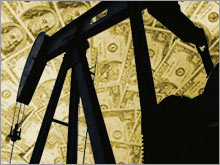Big Oil's tight pocketsWith record profits, some investors believe dividend boosts are in order. But experts say managers at the majors are making the prudent choice in holding back.NEW YORK (CNNMoney.com) -- Like a big fat pig roasting on the spit, Big Oil's record profits have got investors salivating to carve up the cash pile. Faced with soaring production costs and limited access to new oil fields, managers at the integrated companies have mostly complied, returning tens if not hundreds of billions of dollars to shareholders over the past few years.  The thing is, much of these give-backs have come in the form of stock repurchases, which generally raise the value of shares outstanding. That's great for some investors - such as executives with loads of stock options or funds that buy and sell shares on a daily basis. But it has left some small investors, in it for the long haul and hoping for a juicy jump in dividend payouts, feeling passed over at the picnic. "[Profits] are a flag, and investors want a share of that," said John Markese, president of the American Association of Individual Investors. "An increase in the cash dividend is something you receive. It's the certainty of a cash return versus the chance of a stock buyback" actually boosting value. While the U.S. oil majors have steadily increased their dividend since 2002, and currently have a yield of between 1.5 and 3 percent, the dividend paid as a percent of earnings has plummeted over the same time as profits, mirroring the price of crude oil, soared. ConocoPhillips (Charts) paid 53 percent of its earnings as a dividend in 2002. By 2006, that number dropped to 15 percent. A similar pattern is seen as Exxon Mobil (Charts) and Chevron (Charts). Exxon said it returned $32.6 billion to shareholders in 2006, but only $7.6 billion was in the form of a dividend paid on common stock. The remaining was presumably in the form of share buybacks. "We don't normally think that's the most efficient use of cash for shareholders," Richard Ferlauto, director of pension and benefit policy for the American Federation of State, County and Municipal Employees, said of share buybacks in general. "Dividends would get reinvested, it gives us cash that we can redeploy." Yet oil, with its profits tied to the widely fluctuating price of crude, is a different industry - a fact noted by Ferlauto, Markese and other investment professionals. The big concern is that oil companies would raise their dividend, and then the price of oil would fall and the dividend would have to be cut. "At the end of the day it's a commodity and it has its ups and downs - that cycle has not been broken," said Sheraz Mian, an oil and natural gas analyst at Zacks Investment Research. "If you can't sustain [a dividend payout] a few years down the road, you could be in trouble, and the market will punish you." "As investors, we don't want them to set increases that need to be cut at a certain point in time," said Bart Geer, managing director of the Putnam Equity Income Fund, a Boston-based mutual fund that specializes in dividend-paying companies. Geer is comfortable with the small, incremental dividend boosts the oil companies have been making over the last few years. He brought up the idea of paying a one-time, special dividend, but rattled off a list of uncertainties in the oil market and beyond. Among his top concerns: The long-term trading price of crude, the growing tendency of foreign countries to nationalize their oil reserves, and whether the new Democrat-controlled Congress will raise taxes on dividends. "We need answers to some of these questions before we build in a big permanent dividend," Geer said. __________________ |
Sponsors
|

